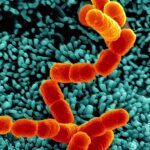Link to Pubmed [PMID] – 18416247
Parasite 2008 Mar;15(1):53-64
It has been suggested that patients with pulmonary surfactant impairment are more susceptible to Pneumocystis infection than healthy controls. Owing the fact that most patients with pulmonary surfactant impairment also suffer from hypoxia, we explored the effect of intermittent hypobaric hypoxia conditions on the ability of non-immunocompromised rats infected by endotracheal route with P. carinii to clear the infection from their lungs. Control rats, inoculated or not with P. carinii, were maintained in normobaric normoxic conditions, and were submitted or not to dexamethasone administration. It was found that even if hypobaric hypoxia weakened host immune mechanisms and impaired significantly the surfactant composition, mainly of surfactant proteins A and D, these changes were not enough to favour the Pneumocystis growth or to inhibit the clearing of Pneumocystis organisms from the lungs of non-immunocompromised rats. The potential influence of surfactant protein changes on Pneumocystis infection is discussed.

